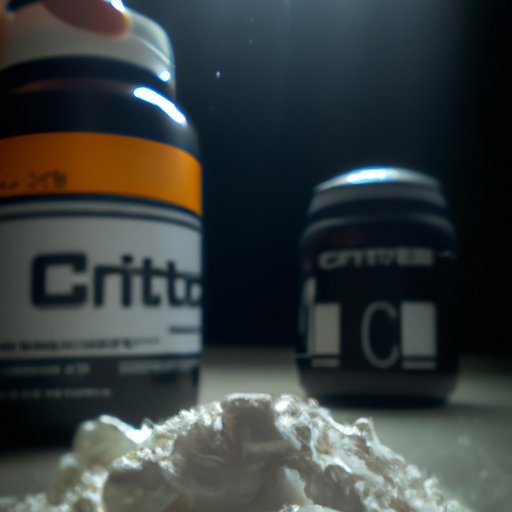Introduction
Creatine is a naturally occurring compound found in the human body that plays an important role in energy production. It is also popularly used as a supplement among athletes and bodybuilders to improve performance and muscle growth. But how long does it take for creatine to work? In this article, we’ll explore the scientific evidence behind creatine supplementation, the benefits and drawbacks of taking creatine, the different types of creatine available, and debunk some common myths.
Examining the Scientific Evidence: How Long Does it Take for Creatine to Work?
When it comes to determining how long it takes for creatine to work, there has been a great deal of research conducted on the topic. A meta-analysis of 19 studies published in the journal Sports Medicine concluded that creatine supplementation can increase maximal strength, power output, and muscle mass in short-term resistance training programs.
Similarly, a review of 45 studies published in the Journal of the International Society of Sports Nutrition found that creatine supplementation can significantly enhance muscular strength and power during high-intensity exercise such as sprinting and weight lifting. The authors also noted that creatine was more effective when taken in higher doses, with optimal results seen at doses of 20-25 grams per day.
The Benefits and Drawbacks of Taking Creatine: What Can You Expect?
Creatine is widely considered to be a safe and effective supplement for improving performance and muscle growth. Studies have shown that creatine supplementation can help increase muscle mass, improve strength, boost energy levels, and enhance recovery time after exercise. Additionally, creatine may also help to reduce fatigue during exercise, which can lead to improved performance.
However, there are some potential drawbacks associated with taking creatine. These include possible gastrointestinal discomfort, muscle cramps, and dehydration. It is important to note that these side effects are typically mild and easily manageable. Additionally, if you are taking any other medications or supplements, it is best to consult with your doctor before taking creatine.
A Guide to Understanding the Effects of Creatine: How Quickly Does it Work?
To understand how quickly creatine works, it is important to understand how it works in the body. Creatine is converted into phosphocreatine, which is then stored in the muscles and used as an energy source during high-intensity exercise. This process can take up to two weeks, but once it is complete, you should start to see an increase in strength and power.
The exact amount of time it takes to see results will vary from person to person, but most people will start to see improvements within four to six weeks of taking creatine. Additionally, it is important to note that it can take up to 12 weeks to reach peak performance levels, so it is important to be patient and stick with your supplementation plan.
Exploring the Different Types of Creatine Supplements: Which One Works Best for You?
There are a variety of different types of creatine supplements available, including monohydrate, hydrochloride, and ethyl ester. Each type of creatine has its own unique properties, so it is important to do your research to determine which one is best for your needs.
Generally speaking, creatine monohydrate is the most widely studied form of creatine and is the most commonly used. However, some people may find that they respond better to other forms of creatine, such as hydrochloride or ethyl ester. Ultimately, it is up to you to decide which type of creatine works best for your needs.
Maximizing Your Results with Creatine: How Long Does it Take to Feel the Effects?
Although creatine can start to work within four to six weeks, it can take up to 12 weeks to reach peak performance levels. To maximize your results, it is important to follow a few key tips. First, make sure to take your creatine supplement consistently, as skipping doses can reduce its effectiveness. Second, combine your creatine supplement with a balanced diet and regular exercise routine. Finally, make sure to stay adequately hydrated, as dehydration can reduce the effectiveness of creatine.
By following these tips, you should start to feel the effects of creatine within four to six weeks. However, it is important to remember that everyone responds differently to supplements, so it may take longer to experience the full benefits of creatine.
Debunking Common Myths About Creatine: How Long Does it Actually Take to Work?
Despite the fact that there is a great deal of scientific evidence supporting the efficacy of creatine supplementation, there are still many misconceptions floating around about how long it takes for creatine to work. One of the most common myths is that creatine only takes a few days to take effect, when in reality it takes several weeks.
Another myth is that creatine causes bloating and water retention, when in actuality it can cause slight increases in body weight due to increased muscle mass. Lastly, some people believe that creatine can cause kidney damage, when in fact there is no scientific evidence to support this claim.
Conclusion
In conclusion, creatine is a popular supplement among athletes and bodybuilders for improving performance and muscle growth. Research has shown that it can take up to four to six weeks for creatine to start working, and up to 12 weeks to reach peak performance levels. Additionally, there are many myths surrounding creatine that should be debunked, such as the idea that it only takes a few days to take effect.
If you are considering taking creatine, it is important to consult with your doctor first and follow a few key tips to maximize your results, such as taking your supplement consistently, combining it with a balanced diet and regular exercise routine, and staying adequately hydrated.
(Note: Is this article not meeting your expectations? Do you have knowledge or insights to share? Unlock new opportunities and expand your reach by joining our authors team. Click Registration to join us and share your expertise with our readers.)
